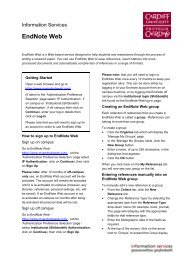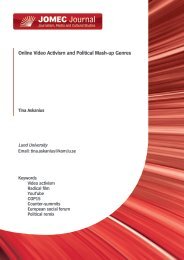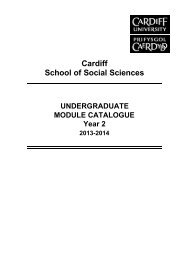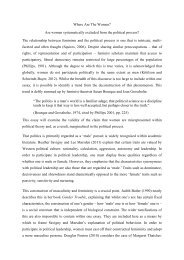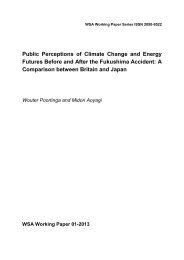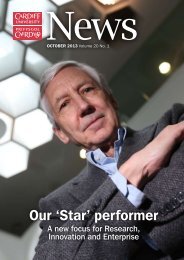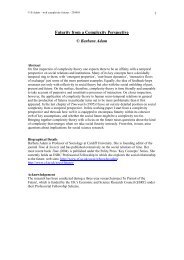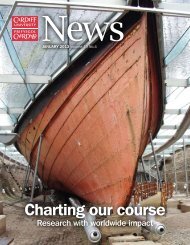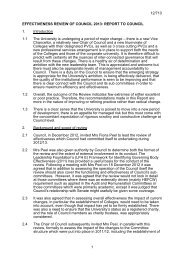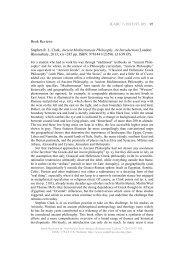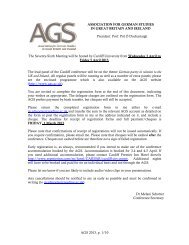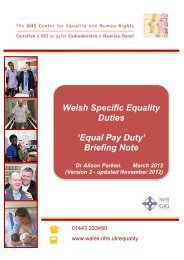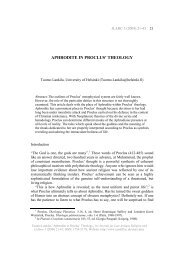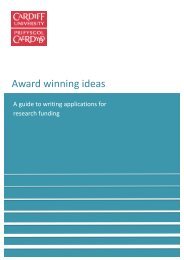Sean Tunney - Cardiff University
Sean Tunney - Cardiff University
Sean Tunney - Cardiff University
Create successful ePaper yourself
Turn your PDF publications into a flip-book with our unique Google optimized e-Paper software.
JOMEC Journal<br />
Journalism, Media and Cultural Studies<br />
The UK Press and Corporation Tax:<br />
Learning Lessons from Ireland<br />
<strong>Sean</strong> <strong>Tunney</strong><br />
<strong>University</strong> of Roehampton,<br />
London<br />
Email: S.<strong>Tunney</strong>@roehampton.ac.uk<br />
Keywords<br />
Irish economy<br />
credit crunch<br />
UK press<br />
business comment<br />
Conservative Party
Abstract<br />
This article analyses comment and editorial in the right-of-centre UK press concerning<br />
Ireland’s economic policy. This is considered in the context of academic analysis of the<br />
Irish economy. Using content analysis, it shows that business comment shared<br />
overwhelmingly the UK Conservative Party leadership’s view that lowering corporate tax<br />
was central to Ireland’s ‘economic miracle’, and tended to advocate policy transfer to the<br />
UK. The views expressed in the newspaper articles are contrasted with the academics'<br />
work. Furthermore, the piece suggests that by urging for the UK to adopt Ireland’s strategy<br />
of tax reduction in order to seek foreign direct investment, the columnists addressed a<br />
traditional focus of investor interests, while downplaying other factors leading to Ireland’s<br />
growth and later downturn.<br />
Contributor Note<br />
<strong>Sean</strong> <strong>Tunney</strong> is Principal Lecturer in Journalism and News Media at the <strong>University</strong> of<br />
Roehampton. His research interests include the politics of media policy making in the UK,<br />
web news, business journalism and online political communications.<br />
cf.ac.uk/jomec/jomecjournal/3-june2013/<strong>Tunney</strong>_Ireland.pdf
Introduction<br />
This article analyses an aspect of how<br />
the UK press considered corporation tax<br />
for over a decade from 2000 to 2011,<br />
when the Conservative Party-led UK<br />
coalition government cut the tax rate by<br />
2% to 26%. This was the first of a series<br />
of progressive reductions enacted,<br />
following a Labour government cut of 2%<br />
in 2008, which is set to leave the rate at<br />
20% by 2015. On the face of it, the 2010<br />
coalition government’s decision to<br />
introduce consecutive cuts to the UK tax<br />
rate businesses pay on profits might<br />
seem unexpected. The tax take, while<br />
having fallen after the credit crisis of<br />
2008, is levied on profitable businesses<br />
that by 2011 were said to be sitting on<br />
record cash reserves (Deloitte 2012;<br />
Devereux and Loretz 2011). It may also<br />
seem contradictory as one estimate is<br />
that just a 3% cut will cost £4.5bn a year<br />
to the Treasury (Jagger 2010), at the<br />
same time as the coalition government<br />
has embarked on significant public<br />
service cuts. Furthermore, it may seem<br />
all the more surprising given that, as a<br />
desperately needed growth strategy,<br />
there is at least some evidence, albeit<br />
contested, that shows lowering corporate<br />
tax rates has little effect internationally in<br />
boosting foreign investment or economic<br />
growth on average (Jensen 2011; Murphy<br />
2011: 30-33).<br />
As early as February 2006, as shadow<br />
chancellor, George Osborne had laid the<br />
basis for corporate tax cuts, using Ireland<br />
as the model for this approach. In an<br />
article in The Times he told readers that<br />
the UK needed to glean lessons from an<br />
economy that had ‘much to teach us, if<br />
only we are willing to learn’. It was the<br />
case that ‘Ireland stands as a shining<br />
example of the art of the possible in<br />
long-term economic policymaking’. The<br />
‘three lessons’ were, first, that ‘Ireland's<br />
www.cf.ac.uk/JOMECjournal<br />
education system is world-class’,<br />
compared to the poorer British<br />
performance. Second, it had ‘world class<br />
research and development’ based on<br />
business tax breaks. And, third, Ireland’s<br />
low corporate rates contrasted with<br />
Britain's, which ‘are becoming among the<br />
highest in the developed world’. Thus,<br />
Osborne concluded: ‘In Britain, the Left<br />
have us stuck debating a false choice.<br />
They suggest you have to choose<br />
between lower taxes and public services.<br />
Yet in Ireland they have doubled<br />
spending on public services in the past<br />
decade while reducing taxes and<br />
shrinking the State's share of national<br />
income’ (Osborne 2006).<br />
George Osborne's position on Ireland’s<br />
success and its lessons for the UK<br />
attracted some comment in the left-ofcentre<br />
media in the midst of Ireland’s<br />
later problems (Robinson 2010; Moss<br />
2010). However, this article will focus on<br />
considering whether his view on Ireland<br />
and corporate taxes was espoused by<br />
the UK right-of-centre press. Academics<br />
have noted in passing that early in<br />
Osborne’s time as shadow chancellor<br />
there was a pressure from right-ofcentre<br />
newspaper columns, also<br />
expressed by press management, to<br />
reduce taxes. However, this observation<br />
was not outlined in detail (Bale 2011:<br />
295, 318; Gamble 2011). Furthermore,<br />
content analysis suggests economic<br />
reporting on UK television excluded<br />
corporation tax from the picture when<br />
presenting alternatives as to whether to<br />
increase taxes to pay for public spending<br />
prior to the credit crisis (Robertson<br />
2010). We wish to analyse commentary<br />
pertaining to Ireland's economy with<br />
regard to this tax; investigating as to<br />
whether newspaper comment and<br />
editorial sided with business interests in<br />
supporting a low tax rate in Ireland prior<br />
to Osborne’s 2006 article. The piece will<br />
1 <br />
@JOMECjournal
also consider whether this backing<br />
continued beyond the point when<br />
Ireland’s problems became clear; aiming<br />
to buttress support among the public<br />
and in Conservative Party circles for a<br />
policy transfer to lower UK corporate tax<br />
rates. Thus, this work adds to the body of<br />
academic literature analysing business<br />
and financial journalism by providing a<br />
specific assessment of economic<br />
reporting tied to ongoing tax policy<br />
developments.<br />
Moreover, when lending to Ireland after<br />
its setbacks, the German government<br />
pointedly expressed concerns that it was<br />
rescuing a country that had taken<br />
businesses and tax revenues away from<br />
Germany, via its low tax policy. German<br />
representatives had intermittently sought<br />
to challenge what was termed 'tax<br />
dumping' and pushed for rates to be<br />
harmonised across the EU, without<br />
success. Similarly, we shall see that the<br />
Irish tax strategy had the potential to<br />
affect UK government revenue. From this,<br />
we want to consider if comment and<br />
editorial writers were primarily focused<br />
on investor interests in multinational<br />
profit maximisation, by minimising<br />
corporate tax payment, over, for<br />
example, citizen concerns regarding UK<br />
state financing.<br />
The work will, firstly, briefly provide a<br />
general assessment of the role of<br />
opinion and editorial journalism,<br />
particularly when analysing business and<br />
economics. It will consider what<br />
academics have suggested as the<br />
reasons for Ireland's recent economic<br />
history. It then reflects on the<br />
methodology employed. Following this,<br />
the article will consider in what way<br />
newspaper commentators proposed that<br />
the Irish ‘miracle’ should inform UK<br />
economic policy, and whether these<br />
opinions changed over time, before<br />
www.cf.ac.uk/JOMECjournal<br />
assessing their claims in the light of<br />
academic analysis.<br />
Analysing the papers<br />
The scope of business and economic<br />
commentary partly rests on a question of<br />
definition, as some journalists who might<br />
be regarded as specialists in political<br />
opinion or social policy often stray into<br />
economic territory. Thus, while economic<br />
opinion pieces can reside alongside<br />
other political commentary in the<br />
opinion section of the paper, they can<br />
also be scattered amongst the business<br />
and economics pages, while editorialstyle<br />
pieces are sometimes placed<br />
alongside business news articles, in a<br />
way little seen in the news sections.<br />
Karin Wahl-Jorgensen has explored<br />
effectively both the editorials and opinion<br />
sections of the UK press (2004, 2008).<br />
And Alistair Duff provides a useful<br />
overview of the literature on political<br />
columnists (2008). Rather than<br />
retreading their ground, a few salient<br />
points emerge. Key to defining the<br />
newspaper's identity, editorials and<br />
commentaries are where ‘journalists are<br />
authorised to express opinion, often<br />
guided by the political leanings of the<br />
newspaper, but also informed by the<br />
desire for a 'balanced forum'‘ (Wahl-<br />
Jorgensen 2008: 67). Of course, this is<br />
where editorials divide from columns.<br />
Editorials provide the newspaper with its<br />
distinctive voice (Wahl-Jorgensen 2008;<br />
Firmstone 2008). Columnists, among<br />
other functions, often provide an<br />
oppositional viewpoint or an unofficial<br />
extension of the title’s predominant<br />
ideology (Holmes 2004: 161-5; Duff 2008:<br />
233). As for where the columnists' voices<br />
are drawn from, Wahl-Jorgensen’s<br />
research notes a contrast to the Danish<br />
press with its tradition informed by the<br />
2 <br />
@JOMECjournal
operation of citizen participation and<br />
deliberative democracy. Instead, UK<br />
newspaper gatekeepers have operated ‘a<br />
professionalised vision of public debate’.<br />
This has restricted the range of voices<br />
within the opinion section to the<br />
newspapers' writers and a rather narrow<br />
elite band of ‘professional journalists,<br />
political insiders or celebrities’, along<br />
with ‘selected experts from academia or<br />
think tanks’ (Wahl-Jorgensen 2004).<br />
A focus of previous business and<br />
financial press analysis has been on<br />
reporting. As UK and US labour and<br />
industrial coverage plummeted from the<br />
1980s onwards, writers note that<br />
financial news increasingly filled the<br />
pages. This was in part driven by the lure<br />
of increased advertising revenue (Davis<br />
2000, 285; Park and Wright 2007;<br />
Tumber, 1993). Howard Tumber,<br />
surveying the British press in the 1980s<br />
and 1990s, has related treatment of<br />
business to national economic<br />
performance. While coverage is generally<br />
supportive, when the British economy<br />
appears to be doing well this support is<br />
reinforced (1983). Steve Schifferes<br />
suggests that shared positive<br />
assumptions of deregulation prior to the<br />
credit crunch led the UK press to<br />
become particularly a ‘cheerleader for<br />
the financial sector’, acting as ‘coconspirators’<br />
in the property boom. Along<br />
with advertising, the fear, in the telling<br />
phrase of one US financial press<br />
advocate, of appearing like ‘a nattering<br />
nabob of negativism’ acted as spurs<br />
(2010: 278, 286-7, 330-1, 333; Roush<br />
2011: 103). Maria Marron's analysis of<br />
the UK and Irish press notes that this<br />
'herd mentality groupthink' continued<br />
throughout coverage of the credit crisis<br />
(2010: 271-3; Schifferes 2011: 333;<br />
Schiffrin 2011: 32-3). And Dean<br />
Starkman’s quantitative analysis<br />
considers that there were in fact fewer<br />
www.cf.ac.uk/JOMECjournal<br />
critical articles in US financial press in<br />
the latter years of the period between<br />
2000 and 2007 (Starkman 2011;<br />
Manning 2013).<br />
As Schifferes describes, there is a<br />
particular long-standing tradition of<br />
commentary in the UK business pages<br />
(2011: 279, 300, 330). International<br />
studies of editorial and commentary<br />
suggest that it has been on these pages<br />
that journalists have had more licence to<br />
be negative (Fahy et al 2010), but that<br />
many specialists with a potentially more<br />
critical eye ‘somehow … never got to<br />
write the columns’, as one journalist put<br />
it (Schiffrin 2011: 21). Nevertheless, with<br />
the onset of the 2008 economic crisis, it<br />
is said comment writers in the UK,<br />
particularly in the tabloids, started to<br />
direct fire at prominent individual<br />
business 'fat cats', with non-specialist<br />
columnists turning their ire on those in<br />
the financial services (Oldfield 2009: 30-<br />
31).<br />
A similar, more subtle, shift has been<br />
detected in sources used by business<br />
writers. Aeron Davis’s research<br />
conducted prior to the credit crunch<br />
suggests that both British business news<br />
and commentary, operating out of sight<br />
of the majority of the general public,<br />
presented debates almost exclusively<br />
between corporate elite sources,<br />
influenced by assumptions from that<br />
elite (2000, 2005). But, as market liberal<br />
assumptions were undermined with the<br />
economy weakening, John Robertson<br />
sees some broadening of the sources<br />
used (2010). And one analysis of the Irish<br />
press's assessment of the role of workers<br />
during the crisis observes there to be a<br />
sizeable number of union sources used<br />
(Cawley 2012). However, studies of the<br />
UK and the Irish press, and US<br />
newspapers and broadcasters show the<br />
use of such diverse voices was rare, as<br />
3 <br />
@JOMECjournal
those variously from the government,<br />
business people and market sources or<br />
think tanks still predominated (Tracy<br />
2011; Schiffrin 2011: 28, 39; Marron et al<br />
2010; Fahy et al 2010). Even coverage of<br />
corporate fraud is said to have<br />
principally privileged business sources<br />
over those of consumer victims (Allen<br />
and Savigny 2012).<br />
Moreover, while the extent to which<br />
financial journalists are specifically in<br />
thrall to corporate sources has been a<br />
point of discussion (Davis 2000; 2003;<br />
Doyle 2006; Tambini 2009; Stiglitz 2010:<br />
50-55; Schifferes 2010: 319), there is<br />
wider agreement that UK business<br />
journalists do not all assume themselves<br />
to be providing a watchdog role, acting<br />
on behalf of the broader citizenry.<br />
Instead, a number see themselves as<br />
reporting primarily from a business<br />
‘investor perspective’ with a focus on<br />
corporate investment, profit and loss, it is<br />
suggested (Tambini 2009: 158-61;<br />
Marron et al 2010, 273-4; Doyle 2006;<br />
Davis 2000; Starkman 2011). One survey<br />
of the literature pithily concludes that UK<br />
business and economic coverage ‘is not<br />
news that is constructed in the public<br />
interest, rather it is news constructed in<br />
the interests of business’ (Allen and<br />
Savigny 2012). This work shall consider<br />
the writers sourced for comment pieces<br />
on the Irish economy. It will reflect on<br />
the assumptions towards business,<br />
particularly the tax burden on firms,<br />
behind the commentary analysed. And it<br />
will consider whether this changed as<br />
the credit crunch tightened its grip.<br />
The Irish economy<br />
It is perhaps no wonder that the right-ofcentre<br />
press and then Osborne might<br />
look across the Irish Sea for inspiration.<br />
The Celtic Tiger was no myth. The 1990s<br />
saw a surge in the Irish economy so<br />
www.cf.ac.uk/JOMECjournal<br />
remarkable that Europe could not fail to<br />
look on. After falling short of West<br />
European living standards for the<br />
previous 30 years, Irish national income<br />
per head soared from two-thirds of the<br />
EU average at the decade's start to<br />
above the average at the finish.<br />
Unemployment plummeted from a 17%<br />
high at the end of 1980s to half the EU<br />
average ten years later (4%) – with the<br />
number in work rising by an astounding<br />
50%. In the meantime, a large budget<br />
deficit became a surplus and the<br />
government slashed its debt-to-GDP<br />
ratio (Barry 2007).<br />
Meanwhile, the history of low corporation<br />
tax, which is associated with the<br />
economy’s growth – the extent to which<br />
we shall consider later – goes back at<br />
least as far as 1957, with the rate most<br />
recently set at 12.5% – approximately a<br />
third of the US rate on active income<br />
(Conefrey and FitzGerald 2009; Sikka and<br />
Willmott 2010, 251). While other parts of<br />
the EU raised long-term concerns over<br />
low rates, the Irish government rejected<br />
criticism and expanded spending. By<br />
2004, Irish GNP had risen by 87 per cent<br />
from a decade previously (Conefrey and<br />
FitzGerald 2009: 20) and construction<br />
boomed.<br />
Only a very small minority of public<br />
sector economists, academics and<br />
journalists questioned the basis of this<br />
growth to face the hubristic response<br />
from the Irish government that they<br />
should ‘go away and die’ (Kitchin et al<br />
2010: 45; O'Toole 2009: 121-3;<br />
MacArthur 2011). Meanwhile, other Irish<br />
business journalists latterly admitted<br />
they feared being seen as ‘economic<br />
killjoys’ if they gave credence to the<br />
dissidents (O'Brien 2011).<br />
However, as is well known, the boom<br />
times were not to last. After Lehman<br />
4 <br />
@JOMECjournal
Brothers collapsed in 2008 and the<br />
credit crisis went into full swing, Irish<br />
property prices nose-dived and, with this,<br />
the wave of construction became a<br />
trickle. A series of bank bailouts and<br />
budget cuts were announced as the<br />
numbers of unemployed soared (Masters<br />
2009: 143; Hardiman 2009). And as GDP<br />
fell further, the government announced<br />
that it would accept a €85 billion loan<br />
package, with the UK coalition<br />
government lending nearly a tenth of the<br />
amount. Backed by George Osborne, the<br />
Irish government vetoed raising the<br />
corporate tax rate, despite German<br />
objections. Instead, it slashed the social<br />
welfare budget by €3.8 billion by 2014<br />
and the hourly minimum wage<br />
(Sunderland 2010; Giles 2010; O'Brien<br />
and McInerney 2010; Winnett 2010).<br />
The depth of Ireland's crisis, notwithstanding<br />
any latter slow recovery, has<br />
prompted a range of academic analysts<br />
to consider the reasons behind the<br />
Celtic Tiger's rise and precipitous fall. We<br />
shall consider these in the context of<br />
lessons for the UK. Firstly, it is the case<br />
that many academics consider low<br />
corporate tax, in attracting foreign direct<br />
investment (FDI), to have been a key<br />
component, if not the main variable, in<br />
Ireland's success story (Barry 2002;<br />
2007; 2010b; Conefrey and FitzGerald:<br />
2009). However, this strategy was not<br />
without its problems. Some calculations<br />
suggest lower Irish corporate rates led to<br />
a fall in the government's overall income<br />
(Conefrey and FitzGerald 2009).<br />
Meanwhile, the focus on attracting FDI<br />
helped lead to a failure of Irish-owned<br />
industrial innovation and left the<br />
structure of the productive economy<br />
vulnerable (Kirby 2010: 147-50; Lane and<br />
Ruane 2006: 39). Also, there are debates<br />
over timing, with FDI having increased a<br />
considerable time after corporate rates<br />
were cut (Conefrey and FitzGerald: 2009),<br />
www.cf.ac.uk/JOMECjournal<br />
leading some analysts to seek further<br />
explanations for the Celtic Tiger’s rise –<br />
some of which also related to its<br />
subsequent decline. Many of these<br />
explanations were particular to Eire,<br />
meaning ‘that Ireland is not really a role<br />
model for others to follow’ (Crafts 2008).<br />
So, secondly, while academic commentators<br />
from different perspectives do<br />
agree that the educational advance<br />
Osborne also referred to was a<br />
significant factor in the Celtic Tiger's rise<br />
(Barry 2007; 2008; 2010a; Lane 2011),<br />
the circumstances of its success are<br />
seen as particular and not easily<br />
replicable in the UK. It was not the Irish<br />
state that above all financed the<br />
transformation of education. Instead, the<br />
EU taxpayer paid out of its social fund<br />
(Barry 2007) to the union’s then poorest<br />
member state; thus using funds the UK<br />
could not access. Moreover, the EU<br />
funded ‘badly-needed infrastructural<br />
projects’ by doubling its regional funds in<br />
1989, which in turn increased the levels<br />
of FDI that could be handled. The<br />
Common Agricultural Policy also<br />
ploughed cash into Ireland's rural<br />
economy (Barry 2008: 30; Kirby and<br />
Carmody 2009; Barry 2007).<br />
Thirdly, while few might have seen Irish<br />
fortunes as faltering by 2006, it was<br />
already being made clear that business<br />
spending on research and development,<br />
in contrast to what Osborne mentioned,<br />
was in fact ‘relatively low’ in international<br />
terms; consistently failing to meet<br />
Ireland’s own targets and lagging behind<br />
the EU average (Suonperä 2009; Kirby<br />
2010: 156).<br />
Fourthly, some other factors are notable<br />
which may be associated with market<br />
liberalisation, such as fiscal stabilisation<br />
in the 1980s, telecommunications<br />
improvements and a booming US<br />
5 <br />
@JOMECjournal
economy (Anyadike-Danes et al 2011:<br />
504). These combined with an unusually<br />
elastic labour force, as emigrants<br />
returned, new migrants arrived and<br />
women and young people entered the<br />
labour market (Adshead and Robinson<br />
2009).<br />
However, fifthly, other issues were less<br />
clearly related to a neo-liberal economic<br />
environment. Another factor analysts<br />
have identified as central to Ireland's<br />
rapid rise was consensual social<br />
partnership wage moderation. This was<br />
in sharp contrast to the accepted rightist<br />
promotion of decentralised wage<br />
bargaining (McDonough and Dundon<br />
2010: 550; Adshead and Robinson 2009:<br />
6). It was only after the social partnership<br />
model developed in the late 1980s that<br />
wage inflation was moderated, economic<br />
stagnation ended and the Irish economy<br />
took off (2007). This cooperative<br />
approach had ‘a pay-tax trade off’<br />
(Whelan and Maître 2007) at its heart,<br />
where the government offered future<br />
personal tax cuts in exchange for wage<br />
constraint (Adshead and Robinson 2009:<br />
15; Kirby and Carmody 2009; Dellepiane<br />
and Hardiman 2010: 10, 13).<br />
As there were factors unique to its rise,<br />
so there were issues specific to Ireland's<br />
fall. Thus many researchers have<br />
considered that mistakes in the<br />
Republic’s domestic policy contributed<br />
to the unsustainable overheating, where<br />
tax breaks fostered unsustainable<br />
construction, for example (Kirby and<br />
Carmody 2009: 25; Lane 2011: 6;<br />
MacArthur 2011; Kirby 2010: 35).<br />
This was bolstered by Ireland's euro<br />
membership, as analysts have<br />
highlighted. Earlier, interest rates had<br />
fallen and the euro’s strong devaluation<br />
against the dollar added to its export<br />
competitiveness (Lane 2011). This left the<br />
www.cf.ac.uk/JOMECjournal<br />
government free to increase spending.<br />
However, latterly, the single currency<br />
proved a straightjacket placed around<br />
the Irish economy, unleashing a ‘tsunami<br />
of low-interest credit’ that the Irish could<br />
not control. This fuelled unproductive<br />
growth and meant Ireland could not let<br />
its currency fall (Dellepiane and<br />
Hardiman 2011: 16), whilst tax cuts<br />
added to its eventual structural deficit<br />
(Lane 2011).<br />
A further factor also reported in the<br />
academic literature was the operation of<br />
an international neo-liberal regime that<br />
had relaxed controls on global capital.<br />
This meant that ‘[n]either the scale of<br />
Ireland’s boom nor the depth of its<br />
collapse would have been possible in an<br />
earlier era’ (Kirby and Carmody 2009:<br />
22). By going with the grain of<br />
globalisation – offering business tax<br />
advantages, while letting credit expand,<br />
focusing on external capital flows, while<br />
the development of an indigenous<br />
industrial base was arrested – the<br />
consequences for Ireland were more<br />
dramatic.<br />
Methodology<br />
This article employs quantitative content<br />
analysis (Hansen 1998: 118-121) to<br />
consider newspaper commentary and<br />
editorial in the UK right-of-centre daily<br />
and Sunday press in a sample timeframe<br />
lasting from January 2000, after<br />
which the Irish boom became<br />
increasingly based on construction, to<br />
April 2011, when a UK corporation tax<br />
rate reduction to 26% took effect. Along<br />
with the Telegraph newspapers and the<br />
Mail titles, we include the Express<br />
newspapers that changed allegiance<br />
from Labour to the Conservatives in the<br />
course of time considered (<strong>Tunney</strong><br />
2007). Following Tim Bale (2011: 18), we<br />
6 <br />
@JOMECjournal
also survey the News Corporation press,<br />
which changed its colours later – only by<br />
2011 – but which in the course of its<br />
support for Tony Blair, and not the<br />
Labour Party as such, maintained a<br />
consistently right-of-centre stance<br />
(<strong>Tunney</strong> 2007; McKnight 2012). To<br />
explore the coverage, it was decided to<br />
use LexisNexis. However, a ‘price is paid<br />
when media analyses depend heavily, or<br />
exclusively, on digital text’ for quantitative<br />
research, which David Deacon has<br />
usefully explored. While Nexis’s archives<br />
can miss relevant articles, keyword<br />
searches only identify the texts sought in<br />
isolation and tell us little about words'<br />
context; leading to searches either<br />
generating ‘false synonyms’ or missing<br />
synonyms (2007).<br />
Given what has been discussed here on<br />
sources, on attitudes to business and in<br />
assessing the relative importance of Irish<br />
corporation tax in the UK press, we used<br />
the quantitative content analysis to<br />
consider:<br />
• which voices were employed as<br />
commentators;<br />
• whether the columnists supported<br />
or rejected the academics' position<br />
on Ireland and low taxes on Irish<br />
business profits;<br />
• what views commentators had on<br />
both lowering UK business taxes<br />
generally and also to a rate below<br />
that the Labour government had<br />
set;<br />
• whether there was a less positive<br />
attitude to business after the crisis<br />
became apparent;<br />
• whether the writers judged that low<br />
business taxes had been a primary<br />
reason for Ireland's economic<br />
success and Ireland's later<br />
economic failure, and, by implication,<br />
whether they shared the<br />
academics’ perspectives on the<br />
www.cf.ac.uk/JOMECjournal<br />
Irish economy;<br />
• what the writers saw as the role of<br />
the euro in both Irish success and<br />
subsequent difficulties.<br />
The reason for considering this latter<br />
point is that, in the course of the<br />
research, it became clear that some<br />
right-of-centre columnists explored<br />
Ireland's later problems through the<br />
prism of euro membership.<br />
To conduct the content analysis, mindful<br />
of the pitfalls outlined, manual filtering<br />
was used to identify where there had<br />
been editorials or comment pieces<br />
which had taken a position either, firstly,<br />
on ‘Irish corporation tax policy’ or,<br />
secondly and more latterly, on ‘George<br />
Osborne and the Irish economy’. The first<br />
search employed both the keywords<br />
‘corporation tax’ and synonyms<br />
‘corporate tax’ and ‘business tax’. In the<br />
second search, terms synonymous with<br />
‘economy’ and also ‘George Osborne’,<br />
such as ‘shadow chancellor’ and<br />
‘chancellor’ depending on the time<br />
period, were employed. For both, the<br />
synonyms of ‘Ireland’ and ‘Eire’ were<br />
considered.<br />
Given that this article discusses<br />
journalism where writers are authorised<br />
to give an opinion, it was decided to<br />
concentrate on articles that had taken a<br />
position on either of these two areas –<br />
rather than focusing on the wider<br />
coverage where any of various keywords<br />
and their synonyms were merely referred<br />
to; many times just in passing. The first<br />
search on Irish corporation tax of all<br />
press material yielded 324 articles and<br />
the second on Osborne's take on the<br />
Irish economy uncovered 1,577. When<br />
filtered to select right-of-centre titles,<br />
exclude Irish editions and duplicates,<br />
and focus exclusively on comment and<br />
editorials taking a position either<br />
7 <br />
@JOMECjournal
positively or negatively on one of the two<br />
themes identified, the final total coded<br />
was 89 articles. While business editors<br />
contributed to the comment and<br />
analysis, only four articles were<br />
newspaper editorials. As to analysing<br />
which sources were employed, the<br />
coding took into account the issue of<br />
mutual exclusivity (Hansen 1998: 118-<br />
121).<br />
While the research method may not have<br />
provided a comprehensive sample<br />
because of possible missing synonyms<br />
and Lexis’s pitfalls, the sample size would<br />
have also been influenced by what<br />
editorial staff perceived as their readers'<br />
preoccupations. And tabloid and midmarket<br />
press staff were likely to have<br />
considered their readers’ interest in<br />
Ireland's economy in the same light as<br />
reporting on the EU (Firmstone 2008).<br />
That is, reckoned to be only of concern<br />
to newspaper buyers when it affects<br />
them domestically (thus reflecting Johan<br />
Galtung and Mari Holmboe Ruge’s<br />
classic study (1965: 64-91)). This would<br />
help explain why the tabloids published<br />
most comment after it emerged that the<br />
UK government was planning to loan<br />
Ireland billions. It would also assist in<br />
identifying why the Sun’s Irish edition<br />
was far keener than its parent, which is<br />
in our sample, to run a series of<br />
editorials and commentaries trumpeting<br />
the need to ‘get behind us on corpo tax’,<br />
with one editorial suggesting that for<br />
‘Brussels [to] insist our Corporation Tax<br />
rate ... be raised … [would leave t]hose<br />
who fought for Irish independence …<br />
turning in their graves’ (Sun Says 2010).<br />
Content analysis results<br />
The first research question refers to who<br />
were the commentators. The findings on<br />
who wrote the comment pieces showed<br />
www.cf.ac.uk/JOMECjournal<br />
that, compared to Wahl-Jorgensen’s<br />
research, there were a larger proportion<br />
sampled that were written by individuals<br />
who were not members of the regular<br />
panel of commentators drawn from the<br />
paper's staff and contributing journalists.<br />
However, out of the 89 opinion and<br />
editorial articles in total, the 21% (19) of<br />
non-journalist sources were still in the<br />
distinct minority. And all indications were<br />
that they were part of the narrow elite<br />
referred to previously as offering a<br />
professionalised view of the debate, as<br />
10 were politicians, six were prominent<br />
business advocates and advisers and<br />
three were what Wahl-Jorgensen<br />
described as the ‘selected experts’ from<br />
right-of-centre think tanks. As for offering<br />
diversity of opinion, the only two that<br />
could be said to counter a right-ofcentre<br />
or a pro-business view were the<br />
two opinion pieces by Labour politicians,<br />
as opposed to the eight Conservative<br />
pieces, including three by Osborne<br />
himself. Yet, it should be noted that one<br />
of the articles written by a Labour<br />
politician, Dennis MacShane, castigates<br />
the Conservatives for not being sufficiently<br />
supportive of business interests<br />
(MacShane 2007).<br />
Secondly, how closely did editorial and<br />
comment mirror the academics<br />
assessment of the role of low<br />
corporation tax in Ireland’s rise? We can<br />
divide this assessment into three<br />
periods. The first considers what writers<br />
had advocated on Irish economic policy<br />
prior to Osborne's 2006 announcement.<br />
The second details the time up until the<br />
international financial crisis started<br />
unravelling in 2008 and the effect on<br />
Ireland became clear. The third is up to<br />
2011.<br />
In the first period of the time-frame we<br />
can see overwhelming support for<br />
Ireland's low corporation tax in the 14<br />
8 <br />
@JOMECjournal
pieces sampled. All of the ten columns in<br />
the Daily and Sunday Telegraph, the<br />
Times and its Sunday counterpart, as<br />
well as the Daily Mail, assumed the low<br />
rate to be part of the recipe for Ireland's<br />
competitiveness and/or economic<br />
success. And all seven of columnists in<br />
the Daily and Sunday Telegraph and the<br />
Times who addressed the question took<br />
explicit lessons from across the Irish Sea;<br />
invoking Ireland so as to press the<br />
Conservatives to campaign to reduce<br />
corporate tax. One early powerful<br />
proponent of the view that the UK<br />
needed to emulate its neighbour was<br />
former Times editor William Rees-Mogg.<br />
While, as we are now aware, the earlier<br />
production-led prosperity was changing<br />
into a finance-led unsustainable boom,<br />
he told readers of the Times in 2002 ‘the<br />
lesson for the British’ was that: ‘Ireland<br />
has by far the lowest rate of corporation<br />
tax and by far the highest inward<br />
investment’. ‘Low business taxes make<br />
rich countries’, he suggested. (Rees-Mogg<br />
2002).<br />
In the second period from Osborne's<br />
2006 article and prior to Ireland's<br />
difficulties becoming clear after 2008,<br />
the focus of much of the sample of 34<br />
newspapers was less on Ireland per se<br />
and more on what the lessons were for<br />
the UK’s corporation tax rate under the<br />
Labour government and any incoming<br />
Conservative administration. The content<br />
analysis indicates that of the 28<br />
commentators and leader writers who<br />
considered this question at the time,<br />
93% (26) viewed Eire’s low business tax<br />
regime as an example to be followed. So<br />
Rees-Mogg's message to Osborne at the<br />
start of the 2006 Conservative conference<br />
was: ‘The higher the levels of<br />
taxation, the lower the rate of growth’<br />
(Rees-Mogg 2006a). This was a point he<br />
reiterated after the conference ended<br />
(2006b) – the long-standing successes of<br />
www.cf.ac.uk/JOMECjournal<br />
'Rhineland capitalism' notwithstanding, it<br />
might be added.<br />
In the third period, after the Lehman<br />
Brothers' collapse and the Irish<br />
difficulties became manifest, the tack of<br />
writers changed. For a year, Irish<br />
corporate tax was only mentioned once.<br />
Afterwards, Ireland's tax policy was less<br />
consistently proffered as an explicit<br />
model for the UK, with 10 of the 41<br />
pieces written in this period suggesting<br />
this and two rejecting the notion. Instead,<br />
low corporation tax rates were now<br />
offered as the solution to Ireland's woes,<br />
with around 90% (17 out of 19) of those<br />
considering this question suggesting this<br />
and two demurring. A lower business tax<br />
was also seen as the way to boost the<br />
UK economy, even if the link with Ireland<br />
was less regularly made. Of those<br />
referring to this, 94% wanted a lower rate<br />
(16), while one questioned this stance.<br />
Over the entire sample period, an<br />
overwhelming majority of just under 92%<br />
(82) advocated a low Irish corporation<br />
tax, which would advantage business<br />
shareholders and investors. Among<br />
those, in the smaller sample of 41<br />
opinion pieces that, additionally,<br />
specifically had a view on George<br />
Osborne and the Irish economy and<br />
government, every one was positive<br />
about the low Irish rate. Regarding the<br />
division between editorial and<br />
commentary, identified earlier, all the<br />
editorials, one from the Times, both the<br />
Telegraph newspapers and the Daily Mail,<br />
supported a low Irish tax, the Mail albeit<br />
tentatively. Just over 8% (7) of the<br />
articles, all penned by columnists,<br />
offered an oppositional viewpoint. To<br />
consider Tim Holmes’s suggestion of<br />
their role (2004: 161-5), most were in<br />
titles where an editorial position was not<br />
made clear or was not strongly voiced in<br />
the sample.<br />
9 <br />
@JOMECjournal
Most of the commentators equally saw<br />
the lessons for the UK as clear. Of the 62<br />
opinion and editorial pieces that also<br />
took a view on what the UK rate should<br />
be, again 94% (58) wanted it cut. And<br />
more than 89% (55) were urging rates to<br />
be reduced further than the Labour<br />
government was to do or had done.<br />
Indicating some diversity within a title,<br />
interestingly, of those against decreasing<br />
the tax, two were of three Sunday<br />
Express opinion pieces. Yet, all three<br />
journalists who penned comment<br />
articles in the Daily Express supported<br />
reducing the UK rate.<br />
And with regard to the question<br />
identified as to whether there was a less<br />
positive attitude to business after the<br />
crisis hit, it was the case three out of the<br />
seven that were critical came before<br />
Ireland’s problems manifested<br />
themselves, and four afterwards. The<br />
later critical articles were mostly more<br />
concerned with the implications for the<br />
UK economy, reflecting Firmstone’s<br />
dissection of editorial news values<br />
discussed earlier. Some published after<br />
the £12 billion loan to Ireland considered<br />
the problems for UK taxpayers in bailing<br />
out another state which had been<br />
underfinanced and that had encouraged<br />
hitherto British firms to transfer their<br />
headquarters abroad in order to pay less<br />
tax. Once more, three of the pieces out<br />
of the seven that were at all negative<br />
about low Irish corporation taxes, either<br />
for the UK or Ireland, were in the Sunday<br />
Express. And these were the only three<br />
opinion pieces in the sample from that<br />
newspaper. Again, this was in direct<br />
contrast to the weekday title. All the four<br />
Daily Express opinion pieces took the<br />
opposite view; being among those<br />
vociferous in their support for low Irish<br />
rates.<br />
www.cf.ac.uk/JOMECjournal<br />
After Ireland's economic problems<br />
became clear and plans for a bailout<br />
were announced, some writers<br />
recognised that there may have been a<br />
general tax shortfall in Ireland,<br />
nevertheless. However, they were in a<br />
distinct minority. Of the 89, one earlier<br />
prescient piece from The Times and two<br />
business commentaries, from the Mail<br />
on Sunday and its Saturday edition, were<br />
the only ones to consider that a low tax<br />
for business presented any problem for<br />
Ireland at any point. The first, published<br />
in 2006 questioned the sustainability for<br />
the Irish treasury of US corporations<br />
exporting profits to Ireland (Mortished<br />
2006). And it cited the research referred<br />
to earlier by Lane and Ruane questioning<br />
the impact of corporate tax. The latter<br />
two pieces published after the bailout<br />
did not focus explicitly on the state's<br />
finances. However, both condemned the<br />
‘rush to the bottom in tax rates’ – one for<br />
helping create ‘the unsustainable bubble<br />
of investment’ (Watkins 2010) and the<br />
other for being ‘self-defeating’,<br />
suggesting, more radically ‘if business is<br />
allowed to dictate tax policy, democracy<br />
is undermined’. Also, this latter article<br />
raised concerns for the UK that it was<br />
‘depriving the … exchequer of much<br />
needed revenue’ (Sunderland 2010).<br />
Regarding the issues raised by<br />
academics to explain Ireland's boom and<br />
bust, only two pieces overall also<br />
mentioned the education of Ireland's<br />
workforce as a reason for its success<br />
story. And the only one to mention<br />
investment in research was one of the<br />
few negative pieces on Irish corporate<br />
rates (Sunderland 2010). Only two<br />
columnists mentioned any of the other<br />
factors academics referred to that were<br />
conducive to developing a market<br />
economy. And no writer mentioned the<br />
impact of social partnership. After<br />
Ireland's difficulties became manifest, six<br />
10 <br />
@JOMECjournal
of the sample did refer to the Republic's<br />
domestic policy as a contributory factor.<br />
However they were in a minority (19%) of<br />
the 32 pieces that focused on the issue<br />
of Ireland’s woes.<br />
Instead more focused on the euro. Most<br />
press commentaries did not mention the<br />
country's sizeable EU funding or euro<br />
membership either as a virtue or as a<br />
vice for the Irish economy in the good<br />
times. Only four feature writers in the<br />
sample saw fit to mention these issues<br />
as factors causing the high growth rates<br />
before the Republic's economic<br />
problems became evident to all. And,<br />
one, Kevin Myers, an Irish columnist<br />
writing in the Sunday Telegraph, while<br />
recognising some EU investment,<br />
nevertheless saw Ireland’s rise as<br />
vindicating a British-style Eurosceptic<br />
neo-liberalism (Myers 2001). Implicitly<br />
ignoring information that, remarkably,<br />
Ireland was the largest recipient of<br />
foreign aid (from the EU) in the decade<br />
prior to the boom (Kirby and Carmody<br />
2009: 26), Myers contrasted the Irish<br />
model with those of EU states ‘wedded<br />
to the notion that the economy exists in<br />
order to subsidise state-sponsored<br />
egalitarian projects’ (2001). However,<br />
such aid puts into context what<br />
academics have emphasised – that<br />
Ireland's rapid rise was as much<br />
because the traditionally agriculturally<br />
based economy in a ‘deferred and<br />
telescoped process’ had a lot of catching<br />
up to do (Anyadike-Danes et al 2011:<br />
506; Adshead and Robinson: 2009).<br />
Regarding the euro, despite the oftstated<br />
Eurosceptic nature of the rightwing<br />
press, it is a prescient piece from<br />
Stephen Glover in the Daily Mail, one of<br />
earliest articles in the sample from 2000,<br />
which stands out. In it, he raises<br />
concerns about Ireland’s boom, focusing<br />
on the constraints that had already had<br />
www.cf.ac.uk/JOMECjournal<br />
been placed on Ireland's economic<br />
policy-making; linking this to the euro<br />
(Glover 2000). It was only when this<br />
‘double-edged sword’ turned into a<br />
liability that the single currency was<br />
mentioned by most writers. Of the 12<br />
times overall where either comment or<br />
leader writers proffered a view on the<br />
euro as such, more than 91% (11) of<br />
those blamed it for the failures of the<br />
Irish economy either partly or exclusively.<br />
It is rather surprising, perhaps, that more<br />
articles considering either corporation<br />
tax or Osborne's views on the Irish<br />
economy did not refer in any way to<br />
other issues referred to by the<br />
academics, particularly the euro. This<br />
may reflect the sample selected and the<br />
methodological questions referred to<br />
earlier. It is important to recognise that,<br />
as the samples focused on corporation<br />
tax, this cannot be regarded as a<br />
definitive account of the numbers<br />
mentioning these issues overall.<br />
Conclusion<br />
Notwithstanding this, most columnists<br />
sampled had gained what they saw as a<br />
valuable lesson from the Irish<br />
government’s handling of its economy,<br />
which they wished the UK Conservative<br />
Party leadership would learn. Yet we can<br />
see, albeit with the luxury of hindsight,<br />
that most writers in the sample shared a<br />
'groupthink' understanding in mistaking<br />
the character of the Irish economy and<br />
believing a policy transfer to the UK<br />
could have the same results. They had<br />
been seduced by an illusory promise<br />
that ‘[f]or several years … it seemed as if<br />
Ireland could have it all: lower direct<br />
taxes as well as increased spending, all<br />
fuelled by a spell of very rapid growth’<br />
(Dellepiane and Hardiman 2011: 14). But<br />
this left the Irish economy in a potential<br />
double bind with its reliance on<br />
11 <br />
@JOMECjournal
companies bringing in FDI paying a low<br />
corporate tax rate, making it ‘particularly<br />
vulnerable to an economic shock’, while<br />
finding itself now ‘in a fast changing<br />
global context that is far less benign than<br />
the one in which the Irish boom took<br />
place’ (Kirby 2010: 63-4; Kirby and<br />
Carmody 2009: 26).<br />
It might be argued that the columnists’<br />
advocacy of the Irish approach was more<br />
for its international neo-liberal tax<br />
policies than Ireland’s domestic 'crony<br />
capitalism'. However, there are two<br />
difficulties with this position. There is a<br />
question of timing. Much of the boom in<br />
the time of the opinion writers’ coverage<br />
after 2000 was based on an<br />
‘unsustainable reliance on construction’;<br />
supporting growth that had a very<br />
different character to that of the Celtic<br />
Tiger years of the 1990s. While later<br />
growth was fuelled by euro-based cheap<br />
credit, it was also strongly supported by<br />
the same consistently praised low<br />
corporate tax culture, where business tax<br />
sweeteners boosted construction (Kirby<br />
and Carmody 2009: 25; Lane 2011: 6;<br />
MacArthur 2011; Kirby 2010: 35). Until<br />
the collapse, the columnists and<br />
editorials, with notable exceptions,<br />
accepted prevailing assumptions and<br />
just praised the tax culture and the Irish<br />
growth. By praising the Irish ‘economic<br />
miracle’, the writers were ignoring a key<br />
component of the later boom and<br />
endorsing implicitly a stark version of<br />
chancellor Gordon Brown's credit-fuelled<br />
pump priming, which Conservatives<br />
criticised as central to the UK’s<br />
economic ills.<br />
Moreover, even if it is true that low<br />
corporation tax has proved significant for<br />
Irish FDI, it does not mean that the same<br />
trajectory would necessarily follow for<br />
the UK. This is because, along with<br />
having first-mover advantage in<br />
www.cf.ac.uk/JOMECjournal<br />
attracting the limited FDI through low<br />
rates, the Irish economy’s relatively small<br />
size meant that such investment has a<br />
disproportionate effect compared with<br />
the impact it would have had on the UK,<br />
as the world’s sixth largest economy at<br />
the time of writing (IMF 2013). Thus,<br />
some analysts consider Ireland to be an<br />
outlier in the relationship between lower<br />
corporation tax rates and flows of FDI<br />
(Jensen 2011: 9, 10; Murphy 2011: 30-<br />
33). So for the UK to cut its rate might<br />
well not impact on boosting growth as<br />
the columnists anticipated.<br />
While some averred, the majority of<br />
newspaper commentators appeared to<br />
provide an extension of their title’s<br />
predominant right-of-centre ideology<br />
and continued to consider that Ireland’s<br />
low corporate tax should be sustained<br />
after the cracks appeared. Many carried<br />
on sharing this view long after the<br />
problems with Ireland’s economy had<br />
become clear. This is perhaps all the<br />
more striking because of the potent<br />
arguments of the few commentators who<br />
challenged this viewpoint. Instead, most<br />
columnists focused, as earlier studies<br />
suggested was the case for financial<br />
journalists, on the concerns of investors<br />
(Tambini 2009: 158-61; Marron et al<br />
2010: 273-4). In this case they tended to<br />
suggest that low corporate rates,<br />
furthering multinational profit maximisation,<br />
offered the preferred method<br />
for long-term state financing. And, while<br />
not seeking to prove cause and effect,<br />
we can see the journalists’ praise for<br />
Irish economic policy helped set a wider<br />
agenda prior to the current and ongoing<br />
trend, at the time of writing, of cuts in UK<br />
business tax rates. The writers had<br />
ignored the unique, less neoliberal,<br />
features described by academics as<br />
contributing to the rise of the relatively<br />
small Irish economy. Among others,<br />
these included massive Euro-state<br />
12 <br />
@JOMECjournal
investment in Ireland making rapid<br />
development possible, which was<br />
sustained by corporatist structures.<br />
Focusing on low corporate tax as a<br />
means to replicate Irish FDI in a much<br />
larger economy meant the lessons that<br />
the columnists learnt for the UK were<br />
partial and questionable.<br />
References<br />
Adshead, M., and Robinson, N. (2009), ‘Late development and state developmentalism – never the<br />
twain? Towards a political economy of ‘post-Celtic Tiger’ Ireland’, Political Studies<br />
Association (PSA) Annual Conference, <strong>University</strong> of Manchester, April 7-9.<br />
Allen, H. and Savigny, H. (2012), ‘Selling scandal or ideology? The politics of business crime<br />
coverage’. European Journal of Communication, Volume 27, Issue 3, 278-290.<br />
Anon, (2011), ‘Budget 2012 - Key points’, RTE, Retrieved on December 14 2011 from:<br />
http://www.rte.ie/news/2011/1206/budget_day2_keypoints.html<br />
Anyadike-Danes, M., et al (2011), ‘New business formation in a rapidly growing economy: The Irish<br />
experience’ (with M. Hart, and H. Lenihan) Small Business Economics, Volume 36, Number<br />
4, 503-516.<br />
Baccaro, L. and Simoni, M. (2007), ‘Centralized wage bargaining and the ‘Celtic Tiger’<br />
phenomenon’, Industrial Relations: A Journal of Economy and Society, Volume 46, Issue 3,<br />
426-455.<br />
Bale, T. (2011), The Conservative Party: from Thatcher to Cameron, Cambridge: Polity.<br />
Barnett, S. and Gaber, I. (2002), Westminster tales: the twenty-first century crisis in political<br />
journalism, London: Continuum.<br />
Barry, F. (2002), ‘A note on transfer pricing and the R&D intensity of Irish manufacturing’. Centre<br />
for Economic Research, Working Paper 02/30, <strong>University</strong> College Dublin.<br />
Barry, F. (2007), ‘Third-level education, foreign direct investment and economic boom in Ireland’,<br />
International Journal of Technology Management, Vol. 38, No. 3, 198-219.<br />
Barry, F. (2008), ‘Ireland – politics, institutions and post-war economic growth’, CESifo Forum, 9, 1,<br />
23-34.<br />
Barry, F. (2010a), ‘Politics and economic policymaking in Ireland’ in Hogan, John, Donnelly, Paul F.<br />
and O'Rourke, Brendan K. (eds.) Irish business and society: governing, participating and<br />
transforming in the 21st century, Dublin: Oak Tree Press, 28-43.<br />
Barry, F. (2010b), ‘The case against corporation tax harmonisation and tax-base consolidation: a<br />
view’, European Review of Labour and Research, 16: 71.<br />
Cawley, A. (2012), ‘Sharing the pain or shouldering the burden? News-media framing of the public<br />
sector and the private sector in Ireland during the economic crisis 2008-2010’, Journalism<br />
Studies, Vol. 13, Issue 4, 600-615.<br />
13 <br />
www.cf.ac.uk/JOMECjournal<br />
@JOMECjournal
Conefrey, T. and FitzGerald, J. (2009), ‘The macro-economic impact of changing the rate of<br />
corporation tax’, Economic and Social Research Institute Papers WP273, Dublin: Economic<br />
and Social Research Institute.<br />
Crafts, N. (2008), ‘The Celtic Tiger in historical and international perspective’, Warwick Economic<br />
Research Papers, No 867.<br />
Davis, A. (2000), ‘Public relations, business news and the reproduction of corporate elite power’<br />
Journalism, Vol. 1, Issue 3, 282-304.<br />
Davis, A. (2003), ‘Whither mass media and power? Evidence for a critical elite theory alternative’,<br />
Media, Culture & Society, Vol. 25, Issue 5, 669-690.<br />
Davis, A. (2011), How the financial media failed the public and boosted ponzi-scheme finance,<br />
Soothsayers of Doom Symposium, City <strong>University</strong> London, December 13.<br />
Deacon, D. (2007), ‘Yesterday’s papers and today’s technology: digital newspaper archives and<br />
‘push button’ content analysis’, European Journal of Communication, vol. 22 no. 1, 5-25.<br />
Dellepiane, S. and Hardiman, N. (2010), European economic crisis: Ireland in comparative<br />
perspective. Social Science Research Network, SSRN online.<br />
Dellepiane, S. and Hardiman, N. (2011), Governing the Irish economy: a triple crisis. UCD Geary<br />
Institute Working Papers, Dublin.<br />
Deloitte, A. (2012), ‘What to do with corporate cash?’ Retrieved on March 3 2012 from:<br />
http://www.deloitte.com/view/en_XB/xb/news/6105238036755310VgnVCM3000001c56f0<br />
0aRCRD.htm<br />
Devereux, M. and Loretz, S. (2011), Corporation tax in the United Kingdom, Oxford <strong>University</strong><br />
Centre for Business Taxation: Oxford, Retrieved September 16 2011, from:<br />
http://www.sbs.ox.ac.uk/centres/tax/Documents/Corporate%20tax%20in%20the%20United<br />
%20Kingdom.pdf<br />
Dorey, P. (2007), ‘A new direction or another false dawn? David Cameron and the crisis of British<br />
Conservatism’, British Politics, Vol. 2, Issue 2, 137-166.<br />
Doyle, G. (2006), ‘Financial news journalism: A post-Enron analysis of approaches towards<br />
economic and financial news production in the UK’, Journalism, Vol. 7, Issue 4, 433-452.<br />
Duff, A. (2008), ‘Powers in the land?’, Journalism Practice, Vol. 2, Issue 2, 230-244.<br />
Drucker, J. (2010), ‘Google 2.4% rate shows how $60 billion lost to tax loopholes’, Retrieved, May<br />
14 2011, from: http://www.bloomberg.com/news/2010-10-21/google-2-4-rate-showshow-<br />
60-billion-u-s-revenue-lost-to-tax-loopholes.html<br />
Evans, S. (2010), ‘‘Mother's boy’: David Cameron and Margaret Thatcher’, The British Journal of<br />
Politics & International Relations, Vol. 12, Issue 3, 325-343.<br />
14 <br />
www.cf.ac.uk/JOMECjournal<br />
@JOMECjournal
Fahy, D. et al (2010), ‘From boom to bust: a post-Celtic Tiger analysis of the norms, values and<br />
roles of Irish financial journalists’, Irish Communications Review, Vol. 12, 5-20.<br />
Firmstone, J. (2008), 'The editorial production process and editorial values as influences on the<br />
opinions of the British press towards Europe', Journalism Practice, Vol.2, Issue 2.<br />
Galtung, J. and Ruge, M. (1965), ‘The structure of foreign news’, Journal of Peace Research, Vol. 2,<br />
No. 1 64-91.<br />
Gamble, A. (2010), ‘New Labour and political change’, Parliamentary Affairs, Volume 63, Issue 4,<br />
pp.639-652.<br />
Gamble, A. (2011), ‘The return of the Conservatives’, Revue Interdisciplinaire ‘Textes & contextes’,<br />
No. 5, Retrieved, May 14 2011, from:<br />
http://revuesshs.ubourgogne.fr/textes&contextes/document.php<br />
Giles, C. (2010), ‘Osborne says UK loan is ‘for Ireland only’’, Financial Times, December 9.<br />
Green, J. (2010), ‘Strategic recovery? The Conservatives under David Cameron’, Parliamentary<br />
Affairs, Volume 63, Issue 4, 667-688.<br />
Glover, S. (2000), ‘Boom that's a warning to the europhiles’, Daily Mail, August 15.<br />
Hansard (2009), Retrieved October 14 2011, from:<br />
http://www.publications.parliament.uk/pa/ld200809/ldhansrd/text/90611-0007.htm<br />
Hansen, A. et al (1998), Mass communication research methods, London: Macmillan.<br />
Hardiman, N. (2009), The Impact of the crisis on the Irish political system. UCD Geary Institute<br />
Working Papers, Dublin.<br />
Hardiman, N. (2010), Economic Crisis and Public Sector Reform: Lessons from Ireland. UCD Geary<br />
Institute, UCD Geary Institute Working Papers.<br />
Holmes, T. (2005), ‘Creating identities, building communities’ in Keeble, Richard (ed.), Print<br />
journalism: a critical introduction, Abingdon: Routledge.<br />
IMF (2013), World economic and financial surveys: world economic outlook database, Retrieved<br />
June 14 2013, from:<br />
http://www.imf.org/external/pubs/ft/weo/2012/02/weodata/weoselco.aspx?g=119&sg=All<br />
+countries+%2f+Advanced+economies+%2f+Major+advanced+economies+%28G7%29#c11<br />
2<br />
Jagger, S. (2010), ‘Corporate tax will be the lowest in G20, Osborne promises CBI’, The Times, May<br />
20.<br />
Jensen, N. (2007), ‘Fiscal policy and the firm: do low corporate tax rates attract multinational<br />
corporations?’, Comparative Political Studies, Retrieved January 15 2012 from:<br />
http://cps.sagepub.com/content/early/2011/12/15/0010414011428594.full.pdf+html<br />
15 <br />
www.cf.ac.uk/JOMECjournal<br />
@JOMECjournal
Kirby, P. and Carmody, P. (2009), ‘Moving beyond the legacies of the Celtic Tiger’, IIIS Discussion<br />
Paper No. 300.<br />
Kirby, P. (2010), Celtic Tiger in collapse: explaining the weaknesses of the Irish model, Basingstoke:<br />
Palgrave Macmillan.<br />
Kitchin, R., et al (2010), ‘A haunted landscape: housing and ghost estates in post-Celtic Tiger<br />
Ireland’, NIRSA Working Paper 59.<br />
Lane, P. and Ruane, F. (2006), ‘Globalisation and the Irish economy’. IIIS Occasional Paper, no. 1.<br />
Lane, P. (2011), ‘The Irish crisis’, The Institute for International Integration Studies, Discussion<br />
Paper No.356, IIIS.<br />
Lawson, D. (2011), ‘Brace yourself for the ultimate stealth tax’, The Sunday Times, September 25.<br />
MacArthur, J. L. (2011), ‘Mortgaging Irish independence’, Monthly Review, Volume 62, Issue 10.<br />
Marron, M. B. et al (2010), ‘The scorecard on reporting of the global financial crisis’, Journalism<br />
Studies, 11: 2, 270-283.<br />
McCaffrie, B. (2009), ‘Contesting the frame: opposition leadership and the global financial crisis’ in<br />
Hart, Paul and Tindall, Karen (eds.) Framing the Global Economic Downturn, Canberra:<br />
Australian National <strong>University</strong> Press.<br />
McCormick, R. (2011), ‘Towards a more sustainable financial system: the regulators, the banks and<br />
civil society’, Law and Financial Markets Review, Volume 5, Number 2, 129-138.<br />
McDonough, T. and Dundon, T. (2010), ‘The Irish crisis and the paradox of social partnership’,<br />
Industrial Relations Journal, Vol. 41. Issue 6, 544-562.<br />
McKnight, D. (2012), Rupert Murdoch: an investigation of political power, Sydney: Allen & Unwin.<br />
MacShane, D. (2007), ‘The new Tory love-in with the wasteful state is a costly error’, The Daily<br />
Telegraph, March 26.<br />
Manning, P. (2013), ‘Financial journalism, news sources and the banking crisis’, Journalism, Vol. 14,<br />
Issue 2, 173-189.<br />
Masters, A. (2009), ‘Republic of Ireland: from Celtic Tiger to recession victim’ in `t Hart, Paul and<br />
Tindall, Karen (eds.) Framing the global economic downturn: crisis rhetoric and the politics<br />
of recessions, Canberra: Australian National <strong>University</strong> Press.<br />
Moss, V. (2011), ‘George Osborne wanted Britain to copy Ireland's bankrupting fiscal policies’, The<br />
Mirror, November 21 2010, Retrieved October 21 2011 from:<br />
http://www.mirror.co.uk/news/top-stories/2010/11/21/george-osborne-wanted-britain-tocopyireland-s-bankrupting-fiscal-policies-115875-22728518<br />
Murphy, R. (2011), Corporate Tax reform and competitiveness, London: TUC.<br />
16 <br />
www.cf.ac.uk/JOMECjournal<br />
@JOMECjournal
Myers, K. (2001), ‘Ireland fights the UK's battle’, Sunday Telegraph, January 28.<br />
<br />
O'Brien, M. (2011), The Irish press and the financial crisis. Paper delivered to the Soothsayers of<br />
Doom Symposium, City <strong>University</strong> London, December 12.<br />
O'Brien, S. and McInerney, S. (2010), ‘Ireland's nuclear winter’, The Sunday Times, November 28.<br />
Oldfield, C. (2009), The credit crunch commentariat: a report, London: Editorial Intelligence.<br />
Osborne, G. (2006), ‘Look and learn from across the Irish Sea’, The Times, February 23.<br />
O'Toole, P. (2009), Ship of fools: how stupidity and corruption killed the Celtic Tiger, London: Faber<br />
and Faber.<br />
Palen, R., et al (2010), Tax havens: how globalization really works, Ithaca, NY: Cornell <strong>University</strong><br />
Press.<br />
Park, D. and Wright, L. (2007), ‘Giving Labor the Business? Changes in Business and Labor<br />
Reporting from 1980 to 2000’, Labor Studies Journal, Volume 32, Issue 1, 60-81.<br />
Rees-Mogg, W. (2002), ‘Odds shorten on a Nice vote if they can get it’, The Times, October 14.<br />
Rees-Mogg, W. (2006a), ‘Fly low, fly slow is always fatal advice for a man piloting Tory taxation’, The<br />
Times, October 2.<br />
Rees-Mogg, W. (2006b), ‘Reform taxes Dave, and the sky's the limit’, Mail on Sunday, October 8.<br />
Robertson, J. W. (2010), ‘The last days of free market hegemony? UK TV news coverage of<br />
economic issues in spring 2008’, Media, Culture & Society, Volume 32, Issue 3, 517-529.<br />
Robinson, D. (2010), ‘The Irish verdict George Osborne would like to forget’, Retrieved October 21<br />
2011 from: http://www.newstatesman.com/blogs/the-staggers/2010/11/ireland-osbornetax-irish<br />
Roush, C. (2011), ‘The financial press: it is not as bad as its reputation’ in Anya Schiffrin (ed.) Bad<br />
news: how America's business press missed the story of the century, New York: New Press.<br />
Rutherford, J. (2008), ‘Fraternity without equality, and other Conservative ideals’, Soundings,<br />
Summer.<br />
Savigny, H. and Temple, M. (2010), ‘Political marketing models: the curious incident of the dog that<br />
doesn't bark’, Political Studies, 58: 1049-1064.<br />
Schifferes, S. (2011), ‘The Financial Crisis and the UK Media’ in Anya Schiffrin (ed.) Bad news: how<br />
America's business press missed the story of the century, New York: New Press.<br />
Schiffrin, A. (ed) (2011), Bad news: how America's business press missed the story of the century,<br />
New York: New Press.<br />
Shaxson, N. (2011), Treasure islands: tax havens and the men who stole the world,<br />
17 <br />
www.cf.ac.uk/JOMECjournal<br />
@JOMECjournal
London: Random House.<br />
Sikka, P. and Willmott, H. (2010), ‘The dark side of transfer pricing: its role in tax avoidance and<br />
wealth retentiveness’, Critical Perspectives on Accounting (2010) Volume: 21, Issue: 4, 342-<br />
356.<br />
Sowels, N. (2007), ‘The economic policy agenda of the Conservative party’, Observatoire de la<br />
Société Britannique, vol. 4.<br />
Starkman, D. (2011), ‘Power Problem’ in Anya Schiffrin (ed.) Bad news: how America's business<br />
press missed the story of the century, New York: New Press.<br />
Suonperä, R. (2009), ‘Lessons for Ireland from the Finnish Crisis’, Dublin Economic Workshop,<br />
Kenmare, 16 October. Retrieved April 14 2011 from:<br />
http://www.ibec.ie/IBEC/DFB.nsf/vPages/Economics_and_taxation~Resources~lessons-forireland-<br />
from-the-finnish-crisis-of-the-1990s-19-10-<br />
2009/$file/Lessons+for+Ireland+from+the+Finnish+Crisis+of+the+1990s.pdf.<br />
Sun Says (2010), ‘Freedom lost’, Sun (Irish edition), November 19.<br />
Sunderland, R. (2010), ‘Some taxing questions on Irish bailout’, Daily Mail, November 27 2010.<br />
Tambini, D. (2010), ‘What are financial journalists for?’, Journalism Studies, Vol. 11 Issue 2, 158-<br />
174.<br />
Tracy, J. (2012), ‘Covering ‘financial terrorism’ The Greek debt crisis in US news media’, Journalism<br />
Practice, Vol. 6, Issue 4, 513-529.<br />
Tumber, H. (1993), ‘‘Selling scandal’: business and the media’, Media, Culture & Society, Vol. 15,<br />
Issue 3, 345-361.<br />
<strong>Tunney</strong>, S. (2007), Labour and the Press, Eastbourne: Sussex Academic Press.<br />
Wahl-Jorgensen, K. (2004), ‘Playground of the pundits or voice of the people? Comparing British<br />
and Danish opinion pages’, Journalism Studies Vol. 5, Issue 1, 59-70.<br />
Wahl-Jorgensen, K. (2008), ‘Op-ed pages’ in Franklin, Bob (ed.), Pulling newspapers apart. London:<br />
Routledge.<br />
Warner, J. (2010), ‘How to avoid debt bail-outs’, The Daily Telegraph, November 18.<br />
Watkins, S. (2010), ‘Higher tax rate is likely price of an Irish bailout’, Mail on Sunday, November 14.<br />
Whelan, C. and Maître, B. (2007), ‘Levels and patterns of multiple deprivation in Ireland: after the<br />
‘Celtic Tiger’’, European Sociological Review, Vol. 23, No. 2, 139-156.<br />
Winnett, R. (2010), ‘British taxpayers to pay billions for European bail-outs’, Daily Telegraph,<br />
November 23.<br />
18 <br />
www.cf.ac.uk/JOMECjournal<br />
@JOMECjournal
This article was first published in JOMEC Journal<br />
JOMEC Journal is an online, open-access and peer reviewed journal dedicated to publishing the<br />
highest quality innovative academic work in Journalism, Media and Cultural Studies. It is run by an<br />
editorial collective based in the School of Journalism, Media and Cultural Studies at <strong>Cardiff</strong><br />
<strong>University</strong>, committed both to open-access publication and to maintaining the highest standards<br />
of rigour and academic integrity. JOMEC Journal is peer reviewed with an international, multidisciplinary<br />
Editorial Board and Advisory Panel. It welcomes work that is located in any one of<br />
these disciplines, as well as interdisciplinary work that approaches Journalism, Media and Cultural<br />
Studies as overlapping and interlocking fields. It is particularly interested in work that addresses<br />
the political and ethical dimensions, stakes, problematics and possibilities of Journalism, Media<br />
and Cultural Studies.<br />
To submit a paper or to discuss publication, please contact:<br />
Dr Paul Bowman: BowmanP@cf.ac.uk<br />
www.cf.ac.uk/jomecjournal<br />
Twitter: @JOMECjournal<br />
ISSN: ISSN 2049-2340<br />
This work is licensed under a Creative Commons Attribution-NonCommercial-NoDerivs 3.0 Unported<br />
License. Based on a work at www.cf.ac.uk/jomecjournal.<br />
.



